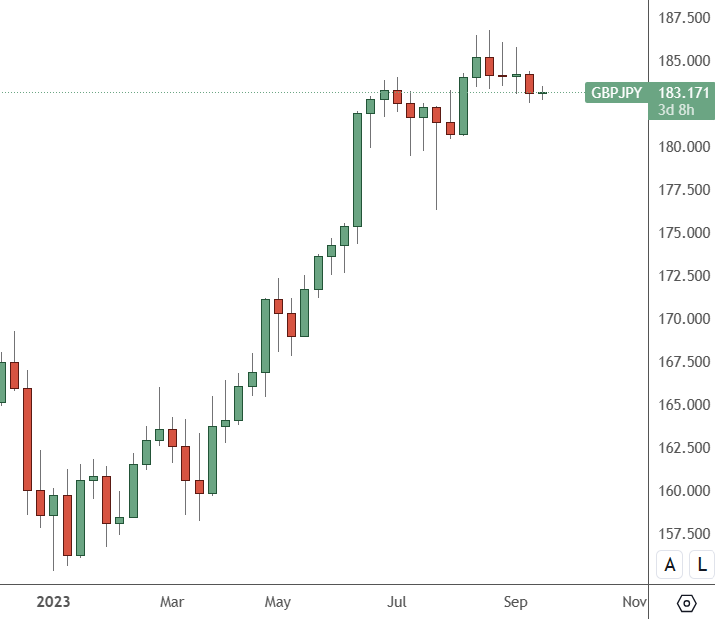The 2023 gains in GBPJPY could come under threat with the British and Japanese central banks in focus this week.

GBPJPY: Weekly Chart
GBPJPY surged in 2023 and now trades at 183.17. There could be a significant downside to 175 or more if the BOJ were to turn bullish. That may take time, with 180 being a first support target.
The other bearish potential would be from a Bank of England Dovish statement. The UK’s 10-year government bond yields climbed by 4 basis points to 4.40% ahead of Wednesday’s inflation data and the Bank of England’s policy decision due on Thursday. The majority of analysts expect the BoE to increase interest rates by 25 basis points to 5.5%.
The UK’s headline inflation rate is expected to climb from 6.8% to 7% as inflation remains elevated.
The Japanese economy also released an inflation report ahead of Friday’s session, and the BOJ statement will follow a few hours later. The Bank of Japan’s aggressive monetary easing campaign will end eventually, Economy Minister Yasutoshi Nishimura said today.
“The BOJ is sustaining monetary easing since various events occurred, such as the COVID-19 pandemic and Russia’s invasion of Ukraine,” Nishimura told a regular post-cabinet news conference.
“But inflation is now accelerating. Given what’s happening across the globe, the BOJ’s policy aimed at buying time will eventually end and normalise,” he said.
The Bank of England is still seeing some inflation pressures and acting on them, while the BOJ sticks to its easing strategy. There have been some comments suggesting an end, with traders expecting rate hikes from Japan in 2024. Expect some volatility if the outlook for that happens more quickly.
The 553.6 trillion yen (US$ 4.87 trillion) of assets the Bank of Japan holds are larger than the country’s economy. The BOJ is now the world’s second central bank after the Swiss National Bank.
“The Bank of Japan’s policy is clearly not sustainable. The BOJ would suffer losses if it had to raise interest rates to, say, two percent,” said Hidenori Suezawa, a fiscal analyst at SMBC Nikko Securities. “Also, in cases of emergencies, such as a natural disaster or a war, the BOJ won’t be able to finance government bonds any longer.”


